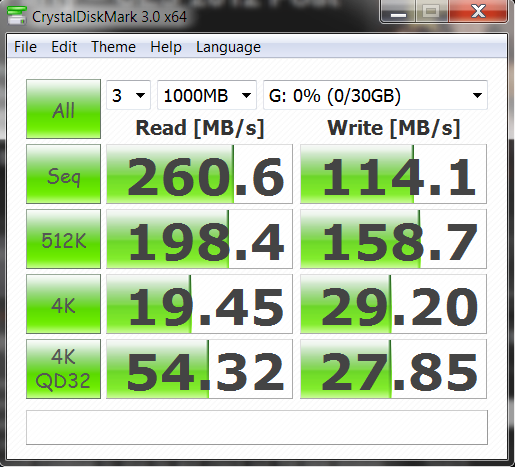CRYSTAL DISK BENCHMARK VER. 3.0 X64
Crystal Disk Benchmark is used to measure read and write performance through sampling of raw (0/1 Fill/compressible) or random data which is, for the most part, incompressible. Samsung SSDs have similar results regardless of the sample data and our test below shows the worst case test scenario with random or highly incompressible data being transferred during the test.
We expected to see the performance results fall into place here as the Crystal DiskMark test, in random mode, uses highly incompressible data which might be seen in such things as movies, photographs and music. This is the worst case scenario for SSD testing and will again be see in the following AS SSD benchmark.
AS SSD is the pioneer of solid state drive targeting testing and uses incompressible data which is favored by many SSD enthusiasts.
 The disk access speed is nice to see and typical in any SSD and the high sequential results are as expected. The low 4k’s are probably the most obvious characteristic of Phison being a value oriented controller which provides for decent value.
The disk access speed is nice to see and typical in any SSD and the high sequential results are as expected. The low 4k’s are probably the most obvious characteristic of Phison being a value oriented controller which provides for decent value.
ANVIL STORAGE UTILITIES PROFESSIONAL
Over the last little while, we have been assisting with beta testing new benchmark software called Anvil Storage Utilities which is an absolutely amazing SSD benchmarking utility. Not only does it have a preset SSD benchmark, but also, it has included such things as endurance testing and threaded I/O read, write and mixed tests, all of which are very simple to understand and utilize in our benchmark testing.
 Once again we move into testing of highly compressible data, similar to that seen with ATTO Disk Benchmark. High sequential results of 257MB/s read and 191MB/s write are excellent results for this mSATA SSD.
Once again we move into testing of highly compressible data, similar to that seen with ATTO Disk Benchmark. High sequential results of 257MB/s read and 191MB/s write are excellent results for this mSATA SSD.
 The SSD Review The Worlds Dedicated SSD Education and Review Resource |
The SSD Review The Worlds Dedicated SSD Education and Review Resource | 

how do you explain that write transfer rate through the cache is better than direct access to HDD? since anyhow the data has to be written to HDD, the performance is based on the Weakest point, i.e the HDD tyhroughput? (may be i write here spupidities but since I am not an expert, I take the chance…
Whether people care to believe so or not, much synthetic testing actually mimics reality. In the case of the HDD vs the cached HDD, it is particularly so. First and foremost, the cached HDD starts and shuts down considerably faster than the regular HDD. This is because the large cache retains frequently used information for access quickly, much as a carpenter secures his tools in a locked room or a new home rather than out in his truck. The tools are quicker to retrieve and, therefore, the work gets done quicker. The cached HDD is much the same and the beauty of this system is that, even in typical use, the cached HDD is visibly quicker in all applications than the regualr HDD. Hope this helps.
Gna buy the lenovo thinkpad twist!
Plan to use iTunes quite frequently due to my iOS devices
It has a 7200rpm 500gb hdd+24gb mSATA
Will it load fast?
Yes it will load faster than a hard drive but the end result is probably that of a cached hard drive if they are configuring as such.
I have a Lenovo y580 without any ssd and its motherboard does not support SRT. It only has an empty msata slot and i am planning to buy a small ssd(32gb or 64gb) for caching. Does the mydigital super cache already have a caching software in its firmware or do we have to install a third party software. Also which cashing software (available to the consumer) would you recommend?